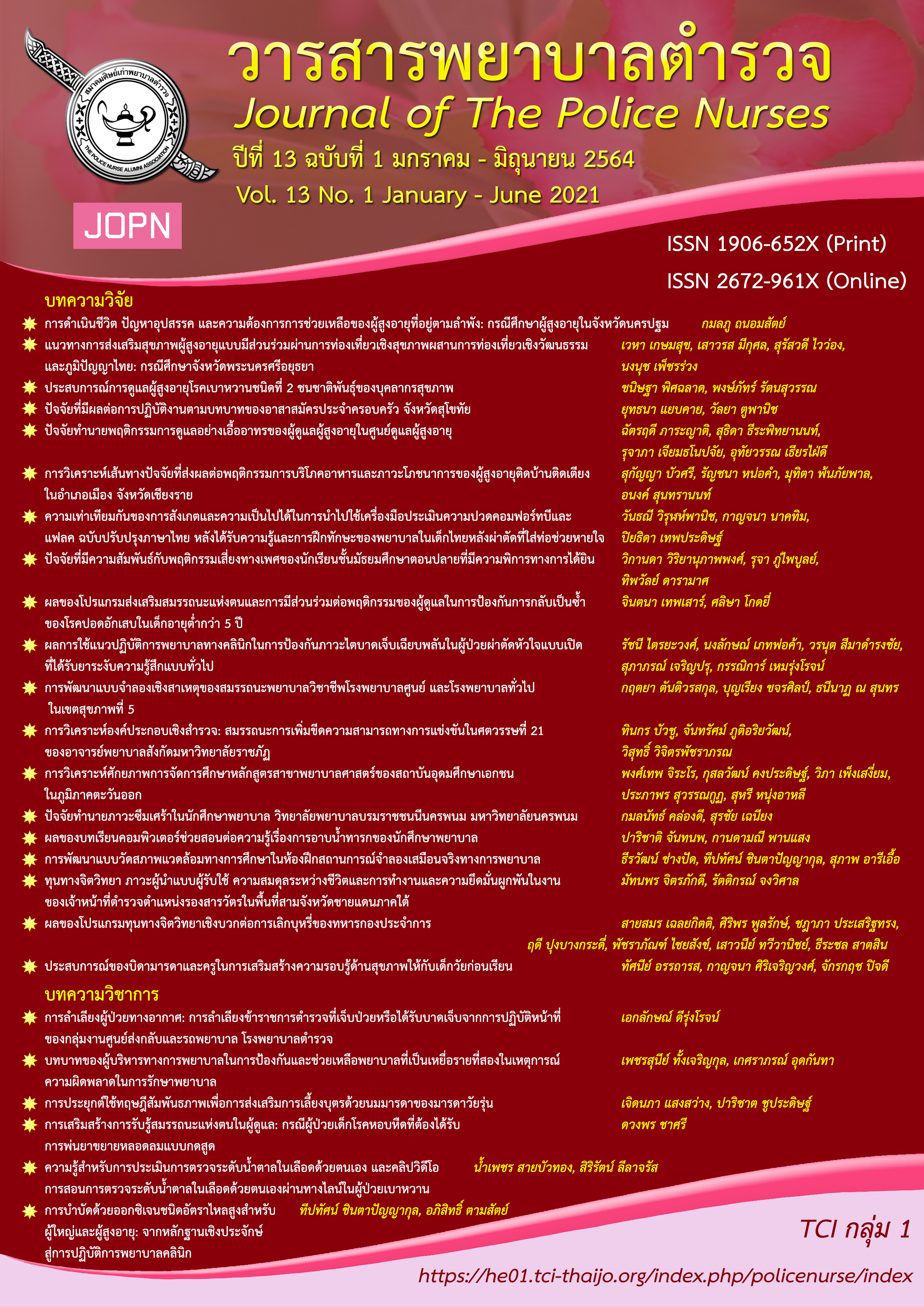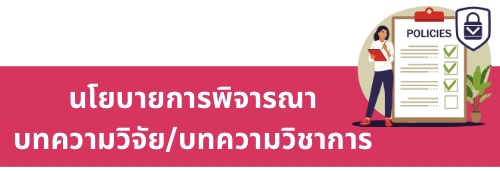ผลของโปรแกรมทุนทางจิตวิทยาเชิงบวกต่อการเลิกบุหรี่ของทหารกองประจำการ
คำสำคัญ:
ทุนทางจิตวิทยาเชิงบวก, การเลิกบุหรี่, ทหารกองประจำการบทคัดย่อ
การวิจัยกึ่งทดลองนี้มีวัตถุประสงค์เพื่อศึกษาผลของโปรแกรมทุนทางจิตวิทยาเชิงบวกต่อการเลิกบุหรี่ของทหารกองประจำการ ตัวอย่างเป็นทหารกองประจำการ (ทหารใหม่) ประจำกองร้อยพลทหารเสนารักษ์และกองพันสารวัตร จำนวน 60 คน แบ่งเป็นกลุ่มทดลองและกลุ่มควบคุม กลุ่มละ 30 คน กลุ่มทดลองได้เข้าร่วมโปรแกรมจำนวน 8 ครั้ง ใช้เวลา 8 สัปดาห์ ในขณะที่กลุ่มควบคุมได้รับความรู้เรื่องทุนทางจิตวิทยาเชิงบวกต่อการเลิกสูบบุหรี่จากบอร์ดเพียงอย่างเดียว แล้วทำการเปรียบเทียบผลก่อนการทดลอง หลังการทดลอง 7 วัน และ 1 เดือน เครื่องมือที่ใช้ในการวิจัย คือ โปรแกรมทุนทางจิตวิทยาเชิงบวกต่อการเลิกบุหรี่ และแบบสอบถามทุนทางจิตวิทยาเชิงบวกต่อการเลิกสูบบุหรี่ ผ่านการตรวจสอบความตรงเชิงเนื้อหาโดยผู้ทรงคุณวุฒิได้ค่าดัชนีความตรงตามเนื้อหาเท่ากับ .92 และ .96 ตามลำดับ และแบบสอบถามได้รับการตรวจสอบความเชื่อมั่นได้ค่าสัมประสิทธิ์แอลฟาของครอนบาคเท่ากับ .88 วิเคราะห์ข้อมูลโดยใช้ความถี่ ร้อยละ ค่าเฉลี่ย ส่วนเบี่ยงเบนมาตรฐาน และการทดสอบทีแบบ paired และ independent
ผลการวิจัยพบว่า หลังการทดลองกลุ่มทดลองและกลุ่มควบคุมมีคะแนนเฉลี่ยทุนทางจิตวิทยาเชิงบวกต่อการเลิกบุหรี่ก่อนการทดลองโดยรวมและรายด้านทั้ง 4 ด้าน ได้แก่ การรับรู้ความสามารถของตนเอง ความหวัง การมองโลกในแง่ดี และความหยุ่นตัว หลังการทดลอง 7 วัน และ 1 เดือน แตกต่างกันอย่างมีนัยสำคัญทางสถิติ (p = .00) โดยกลุ่มทดลองมีคะแนนเฉลี่ยทุนทางจิตวิทยาเชิงบวกต่อการเลิกบุหรี่โดยรวมและรายด้าน หลังการทดลอง 7 วัน และหลังการทดลอง 1 เดือน สูงกว่าก่อนการทดลอง (p = .00) ดังนั้น จึงเสนอให้นำโปรแกรมทุนทางจิตวิทยาเชิงบวกต่อการเลิกบุหรี่มาใช้เป็นเครื่องมือในการช่วยเลิกบุหรี่ในทหารกองประจำการหน่วยอื่น ๆ
Downloads
เอกสารอ้างอิง
Chaleoykitti, S., Sooraksa, N., Kirdpitak, P., & Tongkhambanchong, S. (2012). The development of positive psychological capital of professional nurses through integrative group counseling. Journal of Psychology, 18, 9-27.
Chaleoykitti, S., & Suruksa, N. (2012). Positive psychological capital and human development. Journal of Psychology, 16(), 106-117.
Faul, F., Erdfelder, E., Buchner, A., & Lang, A-G. (2009). Statistical power analyses using G*Power3.1: Tests for correlation and regression analyses. Behavior Research Methods, 41, 1149-1160.
Larson, M., & Luthans, F. (2006). Potential added value of psychological capital in predicting work attitudes. Journal of Leadership & Organizational studies, 13(1), 45-62.
Ornelas, S., Benne, P. D., & Rosenkranz, R. R. (2012). Tobacco use at Fort Riley: A study of the prevalence of tobacco use among active duty soldiers assigned TO Fort Riley, Kansas. Military Medicine, 177(7), 780-785.
Panicharoenrat, N., Pithpornchaiyakul, S., Tianviwat, S., & Cheklong, P. (2020). A promotion of smoking cessation of privates in Fort Ingkhayutthaborihan, Pattani province: A pilot study. Journal of Health Science, 29(1), 48-61.
Pantaewan, P., Onsri, P., & Ounjaichon, S. (2010). Belief, smoking behavior and smoking cessation among Thai military conscripts. Journal of The Royal Thai Army Nurses, 11(3), 59-65.
Pantaewan, P., & Prasittivatechakod, A. (2014). Application of transtheoretical model and smoking behavior modification. Journal of The Royal Thai Army Nurses, 15(1), 36-43.
Rice, V. J., Mary, Z. M., & Gable, C. (2009). Self-reported health status of students in-processing into military medical advanced individual training. Work, 34, 387-400.
Suankul, P., Imamee, N., Therawiwat, M., & Amnajsatsue, K. (2009). An application of stage of change theory on smoking cessation among the conscripts in Vipawadee camp, Suratthani province. Thai Journal of Health Education, 32(112), 33-47.
Swedler, D. I., Knapik, J. J., Williams, K. W., & Jones, B. H. (2011). Risk factors for medical discharge from United States army basic combat training. Military Medicine, 176(10), 1104-1110.
Tobin, R.L., Anderson, J. A., Riviere, L. A., McGurk, D., & Sipos, M. L. (2016). The impact of unit membership on smoking among soldiers. Military Medicine, 181(1), 16-20.
ดาวน์โหลด
เผยแพร่แล้ว
รูปแบบการอ้างอิง
ฉบับ
ประเภทบทความ
สัญญาอนุญาต
ผลงานที่ได้ตีพิมพ์แล้วจะเป็นลิขสิทธิ์ของวารสารพยาบาลตำรวจ















